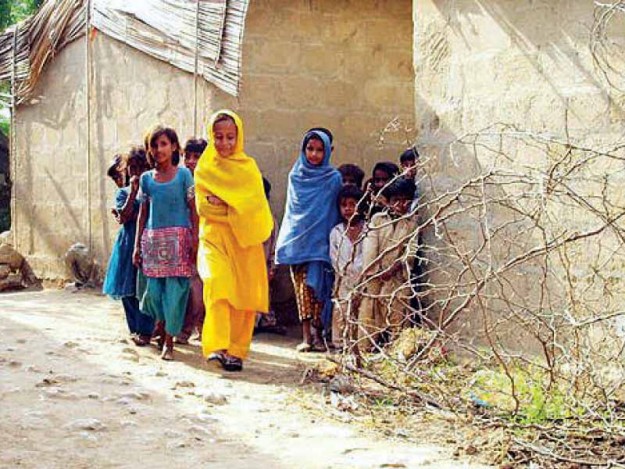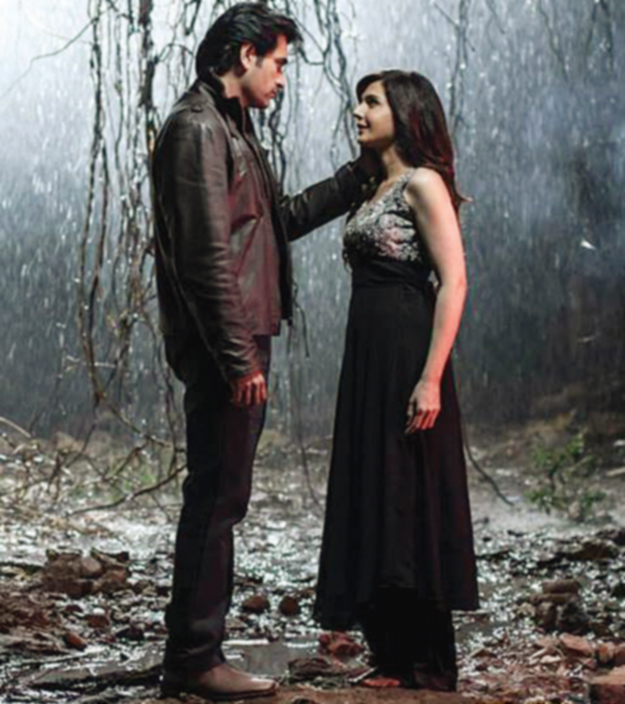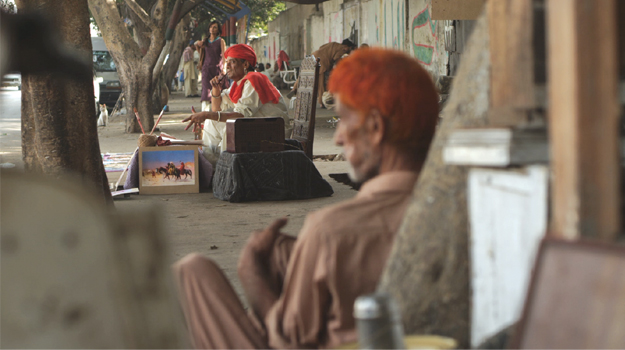With a delay of about an hour-and-a-half and some broken chairs, the curtain for Aapki Soniya finally parted like a rusted sliding door, as the ear-piercing creaks told the venue’s real story.
Contrary to a typical stage, the audience is exposed to a rather simple set where two characters are talking to each other by reading out letters. Surprisingly, this format is maintained throughout the play. Aapki Soniya cannot really be called theatre as the audience may know it, but is more a half-cooked version of what is called a ‘reader’s theatre’, something that was introduced in Pakistan by actor Zia Mohyeddin and has once again been reinvented by director Alyy Khan.
With his dynamic voice and effortless acting, all that Mohyeddin needed was a podium to read excerpts of his favourite literary pieces. In Aapki Soniya, we instead see an entire narrative unfolding by the readers. What works for the play is that it is elegant and unpretentious with minimalistic treatment. What doesn’t work is that the play is way too under-rehearsed for such a basic concept. You will love it if you’re a fan of crisp Urdu dialogues but will surely be left wanting more if you enjoy compelling stories.
Written by Javed Siddiqi, the play is a sequel to his previous work Tumhari Amrita, in which politician-cum-lawyer Syed Zulfiqar Haider is talking to the love of his life Amrita, an artist. In this follow-up, Amrita’s daughter Soniya (Mehwish Hayat), starts writing letters to a rather older version of Haider (Sajid Hasan) in order to find out what exactly happened between them. It’s a very fine script with enough drama to keep you glued to your seats and one-liners that are bound to leave a lasting impression despite the dearth of movement. That being said, Siddiqi’s signature melodramatic undertone makes the love saga seem very superficial, making your cathartic experience as hollow as it usually is after watching a mainstream Bollywood film; you don’t take the experience home with you.

Being cast next to someone like Sajid Hasan takes a lot of courage, but Hayat plays the role with great precision. She usually does go a little over board on TV but hats off to Khan for making her undergo the journey of Soniya — from an anxious little girl to a more unfulfilled but self-aware individual — so instrumentally. Hasan was surprisingly a disappointment because one does not expect a veteran like him to jumble and fumble words and deliver lines so flatly. It almost leaves audience members feeling cheated and deprived of having a true experience. It was obvious that they needed to rehearse a lot more to get the chemistry going, which is by far the only driving force of the play.
As far as the dialogues are concerned, they are mere toppings over a curry served cold. Using microphones was not a good choice at all because where it projected their voices evenly, it robbed us of the raw experience of theatre. It isn’t really hard to throw your voice sans a mic, especially at the relatively smaller Southend Club.
Nevertheless, Khan deserves credit for the simple yet moving use of aesthetic tools to maintain the feel of the play. As the mood of the play evolves, so does the colour temperature of lights from yellow to darker shades of blue and purple. This specific change in setting gives the audience a more incisive look into the lives of the characters. Secondly, the background score consisting of Aamir Zaki’s guitar sounds enhances the atmosphere of the play and one only wishes that it was used more to break the monotony at places.
Overall, Aapki Soniya is a breath of fresh air at a time when too much garbage has taken over theatres in Karachi. However, they need to work a lot harder for a picture perfect performance — something expected out of stars like Khan and Hasan. The play runs at the Southend club every evening at 7:30pm till July 29. Go get your tickets now in case you are interested in a feel-good romantic play.
Verdict: Aapki Soniya is an unpretentious romantic play with a very minimalistic treatment. However, it is way too under-rehearsed for such a basic concept. You will love it if you’re a fan of crisp Urdu dialogues but will be left wanting more if you enjoy compelling stories.
Published in The Express Tribune, June 22nd, 2013.
Like Life & Style on Facebook, follow @ETLifeandStyle on Twitter for the latest in fashion, gossip and entertainment.










































